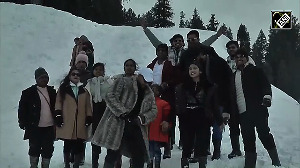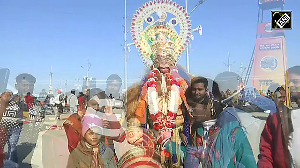Rajeev Srinivasan on how insurgents and terrorists seem to have more human rights than the average citizen in India. First of a two-part series.
Even though 2010 went down in history as the year of the scam, several news stories unrelated to these scandals stood out in my mind as emblematic of what truly ails India: the reality that the average person is increasingly at the mercy of a predatory State. I am reminded of G Aravindan's masterful cartoon series in Malayalam in the 1960s and 1970s: Little People in a Big World.
The first 'small people' story was the death, at the ripe old age of 91, of K Karunakaran, known as 'Leader' in Kerala, long-time Congress politician and three-time chief minister. To be precise, it wasn't specifically what Karunakaran had done that stood out in my mind -- he did do quite a lot of good, I am sure -- but what he had not done. And of course, Karunakaran was not a small person, but Rajan was.
Rajan was the young engineering student who 'disappeared' during the Emergency in 1976 when Karunakaran was the home minister. Rajan was taken into custody and never seen again, assumed tortured and killed. His father, Eachara Warrier, was an ordinary man, but he became a hero -- for he waged an unrelenting struggle for the rest of his life to get the State to admit the truth about his child. The State -- and death -- defeated him in the end, but oh, what a magnificent defeat it was!
And Karunakaran never showed any remorse for the incident, although, legally and morally, he was responsible, as the minister in charge.
The story of that lonely, grieving, lion-hearted father forever tainted whatever Karunakaran achieved in his long life. Eachara Warrier never got an answer to his question: "What became of my son?" And his story is a metaphor for the predatory State that India has become. Perhaps it would be more accurate to say, the "predatory State that independent India has retained as its inheritance from the imperialists".
It is baffling that other arms of civil society, including the media and the civil-rights people, did nothing to help Eachara Warrier in his search for the truth about his son. Even though the courts ordered the government to produce Rajan in response to Warrier's habeas corpus petition, and several policemen lost their jobs, the State stone-walled him through red-tape.
India has a well-developed human rights cottage industry, with the People's Union for Civil Liberties and suchlike doing a lot of good work. They help ensure that there are checks and balances to the State's power, and therefore one would imagine they were in the forefront of helping to find out about Rajan. But, surprisingly, they were not much in evidence, so far as I know. Nor were the usual knee-jerk bleeding-heart intellectuals.
In fact, I am told -- I don't know this first hand, as I wasn't in Kerala while Warrier carried on his lonely crusade -- that certain media close to the Congress (you know who they are) chose to malign Rajan and Warrier. I presume this was because of Rajan's alleged Naxalite links, although from what I can tell, he was probably no more than a kid who might have entertained idle notions of revolution fashionable in the 1970s -- there is absolutely no evidence of his consorting with violent terrorists.
This is in stark contrast with another year-end story, that of Binayak Sen, sentenced to life imprisonment on charges of treason, by way of his continual consorting with Communist terrorists sworn to overthrow the State (which nobody denies). The usual suspects in the media and the self-proclaimed 'intellectuals' of the JNU variety have had a conniption in support of Sen; they, absurdly, accuse the court of a mistrial. Nobel Prize-winners, 22 of them, no less, were earlier rounded up to press the government to free Sen.
Some worthies go so far as to condemn the entire Indian judicial system, and to declare that they do not have any faith in it. One of them is a well-known citizen of some independent mobile republic, so it's not clear why their views on India carry weight. It does not seem to occur to those gnashing their teeth that Binayak Sen was not summarily executed. He had a fair trial and has the option of appealing his sentence.
This is a lot more than what happens in the kangaroo courts set up by Binayak Sen's friends. There, poor tribals, accused of being informants or otherwise exhibiting bourgeois tendencies, are indeed summarily executed with no appeal process. There was, for instance, the 20 who were beheaded for participating in government-run polio-immunisation programmes! How dare tribals want their children free of polio!
In fact, even one of the senior comrades, Rabindranath Kar, who, just to hit one of the hot buttons of the 'intelligentsia', was a Harijan, was beheaded (or burned alive or shot, in some versions) along with his wife, in front of their daughter, on charges of not being sufficiently politically correct. Did someone say due process? Did anyone among the usual suspects cry for Rabindranath Kar?
What exactly makes Sen so different from Rajan that the reaction from media and the human rights people are like night and day? The one answer that fits the facts is that Rajan was the child of some lesser god, whereas Sen is a child of a greater god. Rajan had no human rights, whereas Binayak Sen has plenty of human rights.
Are we judging the value of a human life differently in these cases?
Similarly, how come the alleged murder of alleged terrorists Ishrat Jehan and Sohrabuddin at the hands of the State get top billing, but not the alleged murder of engineering student Rajan at the hands of the State?
The human rights of the insurgent, the anarchist and the terrorist are no greater than the human rights of the average citizen, but apparently that is not applicable in India.
It is argued by some that Binayak Sen, being a doctor, is by definition doing 'social service' among the poor tribals. This is a logical fallacy -- doctors have been known to be first-class mass murderers on the side. Jack the Ripper was almost certainly a doctor; Nazi experimenter Josef Mengele definitely was.
Also, Binayak Sen is a pediatrician, not a gerontologist. What explains his 33 visits in 30 days to the home of octogenarian Narayan Sanyal, known terrorist kingpin, sentenced to life along with Sen for crimes against the nation? And by the way, why is Pravin Togadia of the Vishwa Hindu Parishad, a cancer surgeon, not shown the same tender concern extended to doctors in Sen's case?
In addition, there are many charlatans doing serious damage under the rubric of alleged 'social service'. Graham Staines, an Australian missionary, comes to mind. It is not clear that he was doing anything positive; he was certainly doing a lot of 'soul-harvesting', in violation of his non-missionary visa.
Indeed, there are some strange analogies between Binayak Sen and Graham Staines. Sen could well be a sort of Staines 2.0: he seems rather friendly with an outfit called the ISI (no, not that one), a front for Jesuit missionaries involved in conversion. They are following the instructions of a Pope who declared in New Delhi in 1999, on Diwali day, no less: "Just as the first millennium saw the Cross firmly planted in the soil of Europe so may the Third Christian Millennium witness a great harvest of faith on this vast and vital continent [Asia]".
The Jesuits are the holy warriors of the Vatican: that is literally their charter and their oath; so it would not be so far-fetched to compare them to the Taliban and Al Qaeda. The difference is that the Jesuits are less violent, are good marketers, and have a good network in white countries.
This may explain the slew of awards that Binayak Sen suddenly started getting after toiling in well-deserved obscurity for years. Although he may have been doing exemplary work, experience shows that you usually have to be a 'sepoy' (in Rajiv Malhotra's damning term) to get lots of awards.
The 22 Nobel Prize winners trotted out in support of Binayak Sen remind me of the antics of the Aryan Invasion Hoax fans who got 47 academics to sign some petition. Impressive, until it was found that several signatories had no idea what was in the petition, and that most of them were not historians or Sanskritists, but economists, astrophysicists and the like. I would like to know who among these 22 laureates actually had the foggiest idea about Binayak Sen, and how many just signed as routine a propaganda letter put in front of their faces.
Having said all this, I hasten to add that am not casting aspersions on Binayak Sen: he may well be a great guy, and if so, good for him. I am merely attacking his supporters and their loud, flawed 'logic'. I am indebted to blogger Kiran Kumar S for some details about Sen (external link).
Nor would I deny Sen a fair trial, nor do I ask that the judicial process be short-circuited or perverted. However, I do note with amusement that one of those screaming loudly about fair trials has been accused of large-scale perjury and witness tampering, leading to libel and defamation, but I digress.
Binayak Sen deserves a fair trial -- which he got; the best legal representation money can buy -- which he got; and a chance to appeal -- which he has. (Let us note in passing that poor Rajan did not get any of the above.) Therefore, I think the whining about due process is somewhat excessive. Just the fact that you don't like a ruling does not give you the right to condemn the whole system.







 © 2025
© 2025